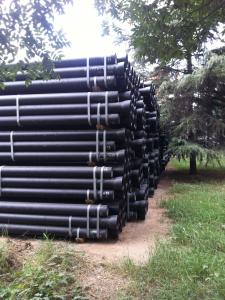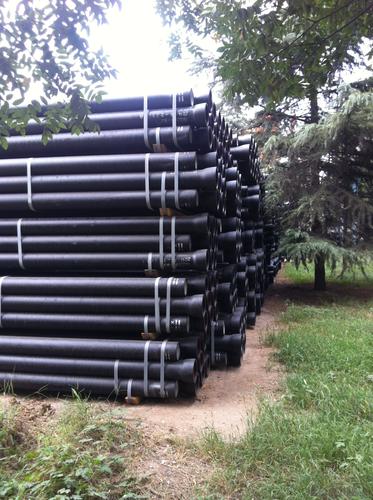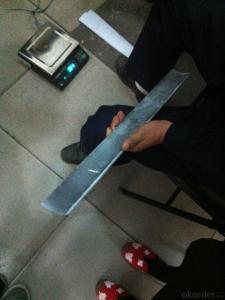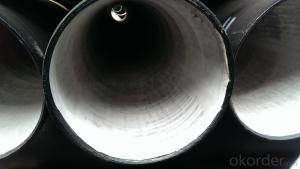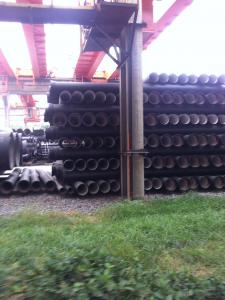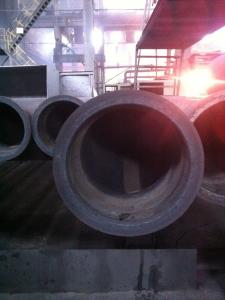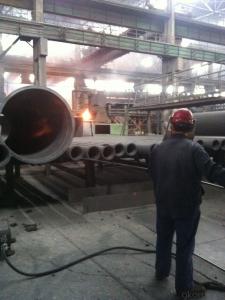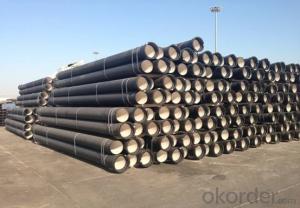DUCTILE IRON PIPES AND PIPE FITTINGS K9 CLASS DN1200
- Loading Port:
- Tianjin
- Payment Terms:
- TT OR LC
- Min Order Qty:
- 22 pc
- Supply Capability:
- 3000 pc/month
OKorder Service Pledge
OKorder Financial Service
You Might Also Like
Material : Ductile Cast Iron
Size Range : DN 80mm to DN 2000mm
Unit Effective Length : 6m or 5.7m
Manufacture Standard: ISO 2531:1998/ EN 545:2006/EN 598:2007
Annual capacity : 200,000 tons
Coating Exterior: Zinc 130g/m2 according to ISO 8179-1 and bitumen coating 70 microns.
Cement Interior: Portland Cement/ High Alumina Cement/ Sulphate Resisting Cement Lining according to ISO 4179
Special requirements on external coating and internal lining can be applied
We also provide accessories such as SBR/EPDM rubber gaskets, lubricant paste, pipe caps, PE sleeves, etc.
Additional Parts:
Each pipe is strictly inspected according to related standard to ensure permanently high performance.
Easy Installation at site and service free for life
Long Service Lifespan
Quotation will arrive you within 24hours once we get your inquiry.
We guarantee offering you a competitive price.
A copy of original inspection reports of pipes will be offered after shipment.
Photos of loading process will be sent to the customer after shipment effect.
We will follow-up the delivery progress after shipment effect and update to the customer on weekly basis.
- Q: What new technologies are there for the installation of ductile iron pipes?
- Type W: type W tube in the same pipe with high strength, low noise, good fireproof performance, long service life, with the characteristics of flexibility and good seismic performance, but also has synchronous construction, utilization rate is high, easy to pipe, reducing the hydraulic test of pipeline clearing times, shorten the construction period to improve economic benefits. In addition, this type of interface with bolts in the lateral fastening, avoids the defects of socket flexible interface flange is easy to damage, close to the wall to the fixed bolt, has the advantages of simple operation, so in the selection of building drainage pipes and fittings, with strong competitiveness. In addition, because the length of W pipe is 3M, the number of intermediate joints is greatly reduced, and any length can be intercepted in accordance with the requirements, thereby greatly saving the pipe material, reducing consumption and cost. W type socket with stainless steel hoop rib clamp, lined with rubber ring flexible connection, seismic performance and good sealing performance, no leakage and allowed to swing in a certain range. Therefore, W tubes are widely used both at home and abroad.
- Q: Are ductile iron pipes suitable for high-temperature applications?
- High-temperature applications are generally not suitable for ductile iron pipes. Despite their strength and durability, ductile iron has limitations in high temperatures. Ductile iron pipes usually have a maximum operating temperature of around 250-300 degrees Fahrenheit (120-150 degrees Celsius). When subjected to higher temperatures, ductile iron pipes can undergo thermal expansion, potentially causing cracks or distortions. This can compromise the pipe's structural integrity, leading to leaks or failures. Additionally, ductile iron is vulnerable to oxidation at elevated temperatures, further deteriorating its performance over time. For high-temperature applications, it is generally advisable to opt for materials specifically designed for such conditions, like stainless steel or high-temperature alloys. These materials offer superior resistance against thermal expansion, oxidation, and other factors associated with high temperatures.
- Q: Are ductile iron pipes suitable for irrigation systems in agricultural fields?
- Yes, ductile iron pipes are suitable for irrigation systems in agricultural fields. Ductile iron pipes have excellent strength, durability, and corrosion resistance, making them ideal for carrying water in irrigation systems. They can withstand high pressure and heavy loads, ensuring reliable water supply to agricultural fields for irrigation purposes.
- Q: Can ductile iron pipe be used for irrigation systems?
- Yes, ductile iron pipe can be used for irrigation systems. Ductile iron is a strong and durable material that can withstand the high pressure and constant flow of water required for irrigation systems. It is resistant to corrosion, making it suitable for underground applications where it may come into contact with moisture and soil. Additionally, ductile iron pipes have the advantage of being able to handle heavy loads, which is important for irrigation systems that may require the use of heavy machinery or vehicles. Overall, ductile iron pipe is a reliable and long-lasting choice for irrigation systems.
- Q: Luo what effect of ductile cast iron
- It should be chromium, chromium is anti graphitization elements in ductile iron if the content for a long time, will hinder the graphitization of cast iron, the iron cementite microstructure (Fe3C) content increased, the chilling tendency of the cast iron increases, will make iron brittle, hard, affect the mechanical properties and processing properties of nodular cast iron.
- Q: What is the weight of ductile iron pipes?
- The weight of ductile iron pipes can vary depending on their size, thickness, and length. Typically, ductile iron pipes can range from a few pounds to several hundred pounds per linear foot.
- Q: Are ductile iron pipes resistant to biological growth?
- Yes, ductile iron pipes are generally resistant to biological growth. The smooth interior surface of ductile iron pipes prevents the buildup of biofilm and inhibits the growth of bacteria and other organisms. Additionally, the material itself is not conducive to the growth of biological contaminants, making ductile iron pipes a reliable choice for water and wastewater applications.
- Q: What are the risks in the process of conveying ductile iron pipes?
- Pile up: when the pipe is stacked, the lower part of the pipe should be covered with a tie or cushion block. The socket of the pipe is interlocked with each other, and the stop wedge must be put in place to prevent the pipe from rolling. Not allowed to be piled on marshes, rough slopes, or badly polluted areas.
- Q: Can ductile iron pipes be used in dam or reservoir projects?
- Yes, ductile iron pipes can be used in dam or reservoir projects. Ductile iron pipes are known for their strength, durability, and corrosion resistance, making them suitable for various applications, including water distribution and transmission systems. In dam or reservoir projects, where the pipes need to withstand high pressure and carry large volumes of water, ductile iron pipes are often preferred. They have excellent mechanical properties, including high tensile strength and impact resistance, which ensure their ability to handle the load and provide a reliable and long-lasting solution. Additionally, ductile iron pipes are also adaptable to various installation methods, including trenchless techniques, making them a versatile choice for dam or reservoir projects.
- Q: How are ductile iron pipes protected against stray current corrosion?
- Ductile iron pipes are protected against stray current corrosion through the implementation of various preventive measures and protective coatings. Stray current corrosion occurs when an electric current passes through the pipe, leading to accelerated corrosion and potential damage. To prevent this, the following measures are typically adopted: 1. Electrical isolation: Ductile iron pipes are electrically isolated from other metallic structures using insulating materials, such as rubber gaskets or non-conductive coatings. This isolation prevents the flow of stray current through the pipe, minimizing the risk of corrosion. 2. Cathodic protection: Cathodic protection is a widely used technique to protect ductile iron pipes from stray current corrosion. It involves the installation of sacrificial anodes or impressed current systems near the pipe. These anodes or systems release a controlled electric current, which counteracts the stray current and ensures that the iron pipe remains cathodically protected. 3. Coatings: Ductile iron pipes are typically coated with protective layers to enhance their resistance against corrosion. One common coating is a fusion-bonded epoxy (FBE) coating, which provides a high level of protection against stray current corrosion. FBE coatings act as a barrier, preventing the electrical contact between the pipe and the surrounding environment. 4. Monitoring and maintenance: Regular monitoring and maintenance are essential to ensure the ongoing protection of ductile iron pipes against stray current corrosion. This involves inspecting the protective coatings for any damage or degradation and promptly repairing or replacing them as needed. Additionally, monitoring systems can be installed to detect and measure stray currents, allowing for timely intervention if necessary. By implementing these protection measures, ductile iron pipes can effectively guard against stray current corrosion, prolonging their lifespan and ensuring the integrity of the pipeline infrastructure.
Send your message to us
DUCTILE IRON PIPES AND PIPE FITTINGS K9 CLASS DN1200
- Loading Port:
- Tianjin
- Payment Terms:
- TT OR LC
- Min Order Qty:
- 22 pc
- Supply Capability:
- 3000 pc/month
OKorder Service Pledge
OKorder Financial Service
Similar products
Hot products
Hot Searches
Related keywords
